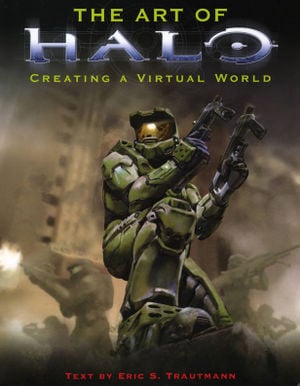The Art of Halo: Creating a Virtual World: Difference between revisions
From Halopedia, the Halo wiki
(Added content review.) |
(Whoops.) |
||
| Line 25: | Line 25: | ||
==Content review== | ==Content review== | ||
''The Art of Halo'' begins with a foreword by Jason Jones and preface by Marcus Lehto. It then introduces "Halo's architects" (Bungie Studios), before chapters on character design, environments, weapons and gear and vehicles. The final chapter, "The Art of Game Design", is a selection of promotional artwork and posters, game engine screenshots, multiplayer map sketches, cinematic storyboards, musical scores, animations and dialogue scripts from ''Halo: Combat Evolved'' and ''Halo 2''. | ''The Art of Halo'' begins with a foreword by Jason Jones and preface by Marcus Lehto. It then introduces "Halo's architects" (Bungie Studios), before chapters on character design, environments, weapons and gear and vehicles. The final chapter, "The Art of Game Design", is a selection of promotional artwork and posters, game engine screenshots, multiplayer map sketches, cinematic storyboards, musical scores, animations and dialogue scripts from ''Halo: Combat Evolved'' and ''Halo 2''.<br> | ||
The majority of the book focuses on the development of the major aspects of ''[[Halo: Combat Evolved]]'' and ''[[Halo 2]]'', from the [[:Category:Weapons|Weapons]], the games environments and the [[Character]] designs. There are many early sketches and concept art for these things, much of it by [[Shi Kai Wang]] and the [[Bungie]] art team. Certain sections show the influence of earlier Bungie games on ''Halo''<nowiki>'s</nowiki> design. One section shows a timeline of Bungie's history. The ideas are shown as they evolved, from a series of sketches to storyboards and their amazing animation. Finally, some screen shots are included to show how the ideas were eventually incorporated into the ''Halo'' games.<br> | |||
There are also many explanations for the processes and the development. For example, the role of [[Unggoy Ultra|Grunt Ultras]]. They also explain what the intentions were for many of the ideas and how they changed over time. | |||
==Trivia== | ==Trivia== | ||
Revision as of 10:21, July 20, 2013
| The Art of Halo: Creating a Virtual World | |
|---|---|

| |
| Attribution information | |
|
Author(s): |
|
| Publication information | |
|
Publisher: |
|
|
Publication date: |
November 9, 2004 |
|
Media type: |
Print (Hardcover) |
|
Pages: |
176 pages |
|
ISBN: |
|
The Art of Halo: Creating a Virtual World is a collection of concept art used for making the Halo games, along with commentary by Eric S. Trautmann. The book includes a foreword by Jason Jones and a preface by Marcus R. Lehto. An updated version, titled Halo: The Great Journey: The Art of Building Worlds, was released on October 18th, 2011.
Official summary
Content review
The Art of Halo begins with a foreword by Jason Jones and preface by Marcus Lehto. It then introduces "Halo's architects" (Bungie Studios), before chapters on character design, environments, weapons and gear and vehicles. The final chapter, "The Art of Game Design", is a selection of promotional artwork and posters, game engine screenshots, multiplayer map sketches, cinematic storyboards, musical scores, animations and dialogue scripts from Halo: Combat Evolved and Halo 2.
The majority of the book focuses on the development of the major aspects of Halo: Combat Evolved and Halo 2, from the Weapons, the games environments and the Character designs. There are many early sketches and concept art for these things, much of it by Shi Kai Wang and the Bungie art team. Certain sections show the influence of earlier Bungie games on Halo's design. One section shows a timeline of Bungie's history. The ideas are shown as they evolved, from a series of sketches to storyboards and their amazing animation. Finally, some screen shots are included to show how the ideas were eventually incorporated into the Halo games.
There are also many explanations for the processes and the development. For example, the role of Grunt Ultras. They also explain what the intentions were for many of the ideas and how they changed over time.
Trivia
- There are many errors in this book, such as a caption pointing at a Plasma Grenade, but pointing it out as an Assault Bomb. However, the Assault Bomb is also present on the page. Another mistake consisted of calling the Prophet of Mercy the Prophet of Truth.
- While the book shows ranks of certain species within the Covenant the Elites' section is missing the ranks of Ultra and Councilor.
- This book shows the Easter egg on the Assault Bomb, where it has writing on it.
- The Sangheili Zealot shown on the Elite ranks has black as its secondary color, although the secondary color for Zealots in-game is brown.
- The level "Assault on the Control Room" is mistakenly titled "Attack on the Two Control Rooms".